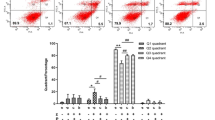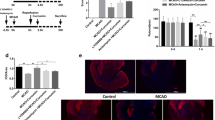Abstract
Inflammatory reactions play a key role in the cerebral injury after stroke or other ischemic brain diseases. Curcumin, which is extracted from herb turmeric, has been reported to have anti-inflammatory effects. The present study was aimed to investigate the anti-inflammatory effects of curcumin on oxygen-glucose deprivation (OGD) injured brain microvascular endothelial cells (BMECs). Rat BMECs were used and the results showed that OGD induced a significant elevation of the leakage of lactate dehydrogenase and the secretion of the proinflammation cytokine, IL-1β. Activation of p38, JNK MAPKs, and NF-κB in BMECs was also observed after OGD. The treatment of curcumin (20 μM) inhibited the increased production of IL-1β both at the protein and mRNA levels. The increased phosphorylation of p38 and JNK induced by OGD was decreased under the treatment of curcumin, whereas the p38 inhibitor, SB203580, significantly inhibited OGD-induced IL-1β production, but the JNK inhibitor, SP600125, failed to do so. These results suggest that the inhibition of IL-1β by curcumin may dependent on the p38 signaling pathway. The OGD-induced IL-1β production was also inhibited by the NF-κB inhibitor, and curcumin suppressed OGD-induced NF-κB activation. Furthermore, the NF-κB activation was attenuated by the SB203580, indicating that NF-κB activation was dependent on p38 signaling pathway. The present study suggests that curcumin displays an anti-inflammatory effect on OGD-injured BMECs via down-regulating of MAPK and NF-κB signaling pathways and might have therapeutic potential for the ischemic brain diseases.




Similar content being viewed by others
References
Danton GH, Dietrich WD (2003) Inflammatory mechanisms after ischemia and stroke. J Neuropathol Exp Neurol 62:127–136
Li W, Li P, Hua Q et al (2009) The impact of paracrine signaling in brain microvascular endothelial cells on the survival of neurons. Brain Res 1:28–38
Wang J, Li PT, Du H et al (2011) Impact of paracrine signals from brain microvascular endothelial cells on microglial proliferation and migration. Brain Res Bull 86:53–59
Gupta SC, Patchva S, Koh W et al (2012) Discovery of curcumin, a component of golden spice, and its miraculous biological activities. Clin Exp Pharmacol Physiol 39:283–299
Wang Q, Sun AY, Simonyi A et al (2005) Neuroprotective mechanisms of curcumin against cerebral ischemia-induced neuronal apoptosis and behavioral deficits. J Neurosci Res 82:138–148
Jiang J, Wang W, Sun YJ et al (2007) Neuroprotective effect of curcumin on focal cerebral ischemic rats by preventing blood–brain barrier damage. Eur J Pharmacol 561:54–62
Zhao J, Yu S, Zheng W et al (2010) Curcumin improves outcomes and attenuates focal cerebral ischemic injury via antiapoptotic mechanisms in rats. Neurochem Res 35:374–379
Wu J, Li Q, Wang X et al (2013) Neuroprotection by curcumin in ischemic brain injury involves the akt/nrf2 pathway. PLoS One 8:e59843
Wang YF, Gu YT, Qin GH et al (2013) Curcumin ameliorates the permeability of the blood–brain barrier during hypoxia by upregulating heme oxygenase-1 expression in brain microvascular endothelial cells. J Mol Neurosci 51:344–351
Zhang L, Zq LIANG (2008) Effect of curcumin on the adhesion of platelets to brain microvascular endothelial cells in vitro. Acta Pharmacol Sin 29:800–807
Perriere N, Demeuse P, Garcia E et al (2005) Puromycin-based purification of rat brain capillary endothelial cell cultures. Effect on the expression of blood–brain barrier-specific properties. J Neurochem 93:279–289
Chen D, Nie M, Fan M-w et al (2008) Anti-inflammatory activity of curcumin in macrophages stimulated by lipopolysaccharides from Porphyromonas gingivalis. Pharmacology 82:264–269
Abe Y, Hashimoto S, HORIE T (1999) Curcumin inhibition of inflammatory cytokine production by human peripheral blood monocytes and alveolar macrophages. Pharmacol Res 39:41–47
Wang S-L, Li Y, Wen Y et al (2009) Curcumin, a potential inhibitor of up-regulation of TNF-alpha and IL-6 induced by palmitate in 3T3-L1 adipocytes through NF-kappaB and JNK pathway. Biomed Environ Sci 22:32–39
Ranjan D, Chen C, Johnston TD et al (2004) Curcumin inhibits mitogen stimulated lymphocyte proliferation, NFkappaB activation, and IL-2 signaling. J Surg Res 121:171–177
Cohen AN, Veena MS, Srivatsan ES et al (2009) Suppression of interleukin 6 and 8 production in head and neck cancer cells with curcumin via inhibition of Ikappa beta kinase. Arch Otolaryngol Head Neck Surg 135:190–197
Stanimirovic D, Satoh K (2000) Inflammatory mediators of cerebral endothelium: a role in ischemic brain inflammation. Brain Pathol 10:113–126
Feuerstein GZ, Wang X, Barone FC (1998) The role of cytokines in the neuropathology of stroke and neurotrauma. NeuroImmunomodulation 5:143–159
Maddahi A, Edvinsson L (2010) Cerebral ischemia induces microvascular pro-inflammatory cytokine expression via the MEK/ERK pathway. J Neuroinflammation 7:14
Irving EA, Barone FC, Reith AD et al (2000) Differential activation of MAPK/ERK and p38/SAPK in neurones and glia following focal cerebral ischaemia in the rat. Mol Brain Res 77:65–75
Hayashi T, K-i Sakai, Sasaki C et al (2000) c-Jun N-terminal kinase (JNK) and JNK interacting protein response in rat brain after transient middle cerebral artery occlusion. Neurosci Lett 284:195–199
Irving EA, Bamford M (2002) Role of mitogen-and stress-activated kinases in ischemic injury. J Cereb Blood Flow Metab 22:631–647
Okami N, Narasimhan P, Yoshioka H et al (2012) Prevention of JNK phosphorylation as a mechanism for rosiglitazone in neuroprotection after transient cerebral ischemia: activation of dual specificity phosphatase. J Cereb Blood Flow Metab 33:106–114
Wallace BK, Jelks KA, O’Donnell ME (2012) Ischemia-induced stimulation of cerebral microvascular endothelial cell Na-K-Cl cotransport involves p38 and JNK MAP kinases. Am J Physiol Cell Physiol 302:C505–C517
Li J, Li Y, Ogle M et al (2010) dl-3-n-Butylphthalide prevents neuronal cell death after focal cerebral ischemia in mice via the JNK pathway. Brain Res 1359:216–226
Benakis C, Bonny C, Hirt L (2010) JNK inhibition and inflammation after cerebral ischemia. Brain Behav Immun 24:800–811
Dogra C, Changotra H, Mohan S et al (2006) Tumor necrosis factor-like weak inducer of apoptosis inhibits skeletal myogenesis through sustained activation of nuclear factor-kappaB and degradation of MyoD protein. J Biol Chem 281:10327–10336
Nonn L, Duong D, Peehl DM (2007) Chemopreventive anti-inflammatory activities of curcumin and other phytochemicals mediated by MAP kinase phosphatase-5 in prostate cells. Carcinogenesis 28:1188–1196
Craig R, Larkin A, Mingo AM et al (2000) p38 MAPK and NF-kappa B collaborate to induce interleukin-6 gene expression and release. Evidence for a cytoprotective autocrine signaling pathway in a cardiac myocyte model system. J Biol Chem 275:23814–23824
Carter AB, Knudtson KL, Monick MM et al (1999) The p38 mitogen-activated protein kinase is required for NF-κB-dependent gene expression. The role of tata-binding protein (TBP). J Biol Chem 274:30858–30863
Berghe WV, Plaisance S, Boone E et al (1998) p38 and extracellular signal-regulated kinase mitogen-activated protein kinase pathways are required for nuclear factor-κB p65 transactivation mediated by tumor necrosis factor. J Biol Chem 273:3285–3290
Acknowledgments
This work was supported by the team of Scientific Research Innovation Foundation of Logistics University of Chinese People’s Armed Police Force (No.: WHTD201308-2). Curcumin attenuates ischemia-like injury induced IL-1β elevation in BMEC via inhibiting MAPK pathways and nuclear factor-κB activation.
Author information
Authors and Affiliations
Corresponding authors
Additional information
Hua-jiang Dong, Chong-zhi Shang and Ding-wei Peng contributed equally to this work (co-first authors).
Li Zhan and Peng Wang are co-corresponding authors.
Rights and permissions
About this article
Cite this article
Dong, Hj., Shang, Cz., Peng, Dw. et al. Curcumin attenuates ischemia-like injury induced IL-1β elevation in brain microvascular endothelial cells via inhibiting MAPK pathways and nuclear factor-κB activation. Neurol Sci 35, 1387–1392 (2014). https://doi.org/10.1007/s10072-014-1718-4
Received:
Accepted:
Published:
Issue Date:
DOI: https://doi.org/10.1007/s10072-014-1718-4




